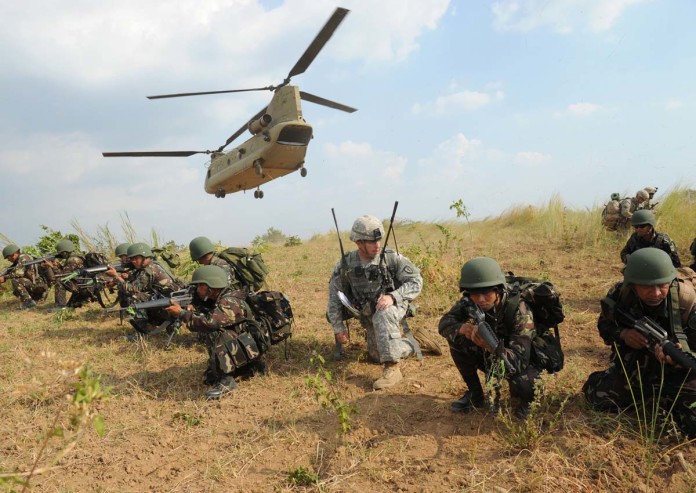Philippine military authorities announced last week the first large-scale combat exercises between United States and Filipino forces under the Duterte administration, in a dramatic rebuff of its criticism of US security policies.
The announcement came on the heels of a speech by President Duterte that he would not allow Philippine forces to conduct joint patrols with the US military in the disputed South China Sea, because he feared the exercises could spark an armed conflict on territory claimed by the Philippines.
Mr Duterte has also alarmed Philippine allies in the Asia-Pacific (including Japan and Vietnam) for calling on the US to withdraw its forces from Mindanao, where he said the minority Muslims resented the presence of US troops.
The participation of Philippine troops in the Oct 4 to Oct 12 combat exercises is not just an engagement in joint patrols in disputed waters.
It is a major show of force involving 1,400 US military personnel and 500 Philippine Marines in amphibious landing and live-fire exercises at a northern gunnery range in the Philippines.
These exercises put military muscle to the PH-US Visiting Forces Agreement (VFA), which the Philippine Supreme Court upheld in January.
The VFA gives the US military the right to increase troops deployed in the Philippines for the war games, and to bring equipment into military areas, including Subic Bay, former site of a US naval base.
This is the security arrangement that Mr Duterte seeks to dismantle in his reckless bid to end US military presence in the Philippines.
He has claimed that he wants to pursue an independent security and foreign policy, but this stance has put the Philippine military on the spot, and prompted the announcement expanding the US participation in the joint exercises.
Despite the President’s provocative statements, US State Department spokesperson John Kirby said that the US had not received any formal request to withdraw its forces from Mindanao, and that it would be premature to respond to media reports on Mr Duterte’s comments.
Presenting himself as a nationalist by playing up the anti-American line, Mr Duterte put the entire country under a national emergency due to a “state of lawlessness” following a bomb attack in his home city of Davao early this month.
The declaration allows him to use the military to assist in fighting crime and violence.
On the presence of US forces, he said it would inflame the situation and suggested that they may be kidnap or murder targets by local terrorist groups.
In announcing the Philippines’ participation in the expanded war games, military authorities appeared to be sending a message warning the President against tampering with longstanding security mechanisms with US.
Military authorities have noted that Mr Duterte has described himself as a socialist, who has had an uneasy relationship with US, and who also has said that he is charting a foreign policy not dependent on US as a treaty ally.
He has taken steps to revive ties with China, which were strained under the Aquino administration.
It was during the term of President Benigno Aquino III that a suit was filed by the Philippines at the Permanent Court of Arbitration in The Hague concerning the territorial disputes in the South China Sea.
The arbitral court eventually ruled that China’s claim over almost the entire South China has no basis in international law. China has refused to recognise the ruling.
Mr Duterte’s conciliatory overtures to China appear to be undermining the prospects of implementing the arbitral court’s ruling.
He appears to be oblivious of the contradictions posed by his friendly approaches to China, vis-a-vis his declaration of forging an independent foreign policy. He has been sending mixed signals on his security and foreign policies, which seem to be mired in ambiguities.
For example, while Mr Duterte steps up his attacks on the United States, he has said he will not abrogate the US-PH Mutual Defence Treaty and will maintain the longstanding alliance of the two countries.
“I have never said, Get out of the Philippines. After all, we need them there in the South China Sea. We don’t have armaments,” Mr Duterte said.
He added that the Philippines is not ready to go to war with China, and that he would not want it to because it would be a “massacre”.






